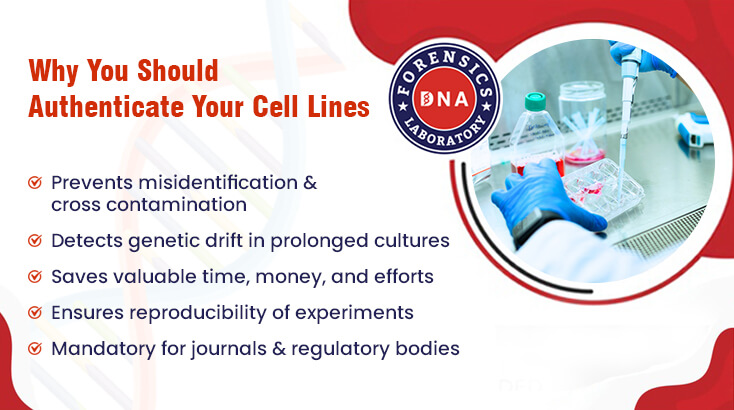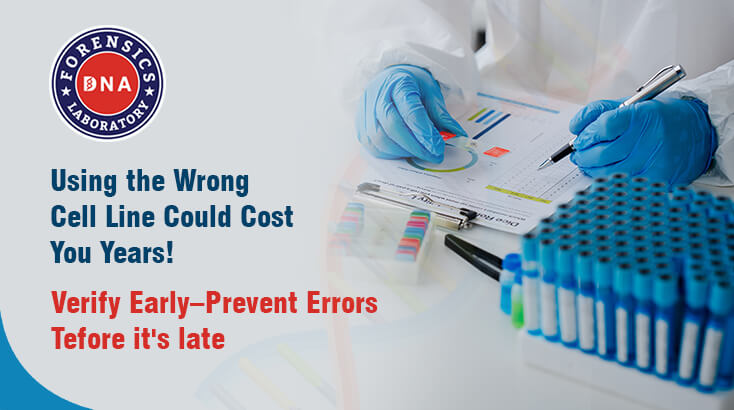Understanding Cell Line Authentication Testing – The Foundation of Reliable Research
Have you ever wondered how scientists ensure the integrity of their experiments? At the heart of many groundbreaking discoveries lies a crucial process known as cell line authentication.
This essential step in scientific research is often overlooked by even expert geneticists, students, and industries like pharmaceutical companies. This may lead to significant time and monetary losses and compromised research and experiments.
Therefore, it’s high time we shed light on the critical nature of Cell Line Authentication for research and drug manufacturing sectors, academics, and more. In this comprehensive guide, we’ll explore:
- How cell line authentication testing works
- The modern methods involved in the process, and
- Where you can get accurate and reliable Cell Line Authentication Tests in India
Let’s begin!
What Exactly is Cell Line Authentication?
Before we dive into the intricacies of cell line authentication, let’s establish a clear understanding of what this process is.
Cell line authentication is a process used to verify the identity and purity of cell lines used in scientific research. It’s like a DNA test for cells, ensuring that the cells scientists are working with are exactly what they claim to be.
With proper cell line authentication methods, you can detect three major types of errors in your cell lines of interest:
- Misidentification at the source of the collection
- Cross-contamination and
- Genetic drifting
The Importance of Cellular Identity
Imagine you’re a researcher working on a groundbreaking cancer treatment. You’ve spent months, perhaps years, cultivating a specific type of cancer cell to test your new drug. Now, consider the devastating impact if those cells weren’t actually cancer cells at all but a completely different type of cell that had contaminated your sample. This scenario is not just hypothetical – it’s a real problem that has plagued scientific research for decades.
“Cell line authentication is not just a step in the research process; it’s the foundation upon which reliable scientific discoveries are built.”
How Does Cell Line Authentication Work?
Now that we understand the importance of cell line authentication let’s explore how this crucial process actually works. The methods used for cell line authentication have evolved significantly over the years, becoming more precise and reliable.
The Basic Principles
At its core, cell line authentication involves comparing the genetic profile of a cell line to a known reference. This process typically includes the following steps:
- DNA extraction from the cell line
- Amplification of specific genetic markers
- Analysis of these markers to create a genetic profile
- Comparison of this profile to a reference database
Short Tandem Repeat (STR) Profiling: The Gold Standard
One of the most widely used and accepted methods for cell line authentication is Short Tandem Repeat (STR) profiling. This technique focuses on specific regions of DNA that contain repeated sequences of nucleotides.
- STR profiling examines multiple loci (specific locations on a chromosome)
- Each locus contains a unique pattern of repeats
- The combination of these patterns creates a distinct genetic fingerprint
This method is highly effective because:
- It’s highly discriminatory, meaning it can distinguish even between closely related cell lines
- It requires only a small amount of DNA
- It’s relatively quick and cost-effective
Cell Line Authentication for Testing Purposes: Why It Matters
You might be wondering, “Why go through all this trouble just to verify a cell line?” The answer lies in the fundamental principles of scientific research: accuracy, reproducibility, and reliability. Here’s a list of points for your better understanding.
Ensuring Experimental Validity
When scientists conduct experiments using cell lines, they’re making assumptions about the characteristics of those cells. If, during the cell retrieval/collection process, it isn’t what it was supposed to be, those assumptions crumble. This problem or error is often termed ‘misidentification’ of the cell line and can potentially invalidate years of research.
Preventing Cross-Contamination
Cell cultures can easily become contaminated with other cell types. This contamination can occur through:
- Human error during handling
- The presence of fast-growing cell lines that overtake slower-growing ones
- The inadvertent mixing of cell lines
Authentication helps detect these issues before they compromise research results.
Closely Monitoring Chances and Occurrence of Genetic Drifting
Genetic drift in a cell line refers to a random change in its genetic makeup over time. This is common in cases requiring prolonged culturing for experimentation/research. These variations can alter the basic behavior of the cell, leading to inconsistent research results and compromised data reliability. It remains to be another common challenge among professionals.
Why is Cell Line Authentication Important? The Big Picture
We’ve touched on some reasons why cell line authentication matters, but let’s delve deeper into its far-reaching implications.
Advancing Medical Research
Cell lines are crucial tools in medical research, particularly in areas like:
- Cancer research
- Drug development
- Vaccine production
Authenticated cell lines ensure that researchers are working with the correct cellular models, leading to more accurate and reliable results.
Saving Time and Resources
Imagine spending years and millions of dollars on research only to discover that your cell line was misidentified. Cell line authentication helps prevent such costly mistakes.
Enhancing Reproducibility in Science
One of the cornerstones of scientific research is reproducibility. If experiments can’t be replicated, their validity comes into question.
“Reproducibility is the foundation of scientific progress. Cell line authentication is our guarantee that we’re all speaking the same cellular language.”
Ethical Considerations
Using authenticated cell lines is not just a matter of good science; it’s an ethical imperative. It ensures that:
- Animal and human tissue donations are used responsibly
- Research funding is utilized effectively
- Scientific findings are trustworthy and beneficial to society

Where to Get Scientifically Backed & Accurate Cell Line Authentication Tests?
As much as it is important to authenticate your cell lines before starting the study or the experimentation, it’s also important to select a trusted lab. At DNA Forensics Laboratory Pvt. Ltd., we are among the leading and one of the best providers of accurate & reliable Cell Line Authentication Tests.
With over a decade-long experience and a promising track record of highly satisfied clients, we remain your first choice for cell line authentication tests.
We are an ISO 9001 : 2015 certified company with an NABL-accredited testing facility for standardized testing procedures and accurate reports. Our trustworthiness extends beyond individual clients and the private sector. We boast of being the only private DNA testing company doing Legal DNA tests for honorable courts of law in India.
Want to learn more or book your Cell Line Authentication Tests? Feel free to reach out to us at +91 8010177771 Over a phone call. Alternatively, you can drop your queries and questions in a WhatsApp message on +91 9266615552.






